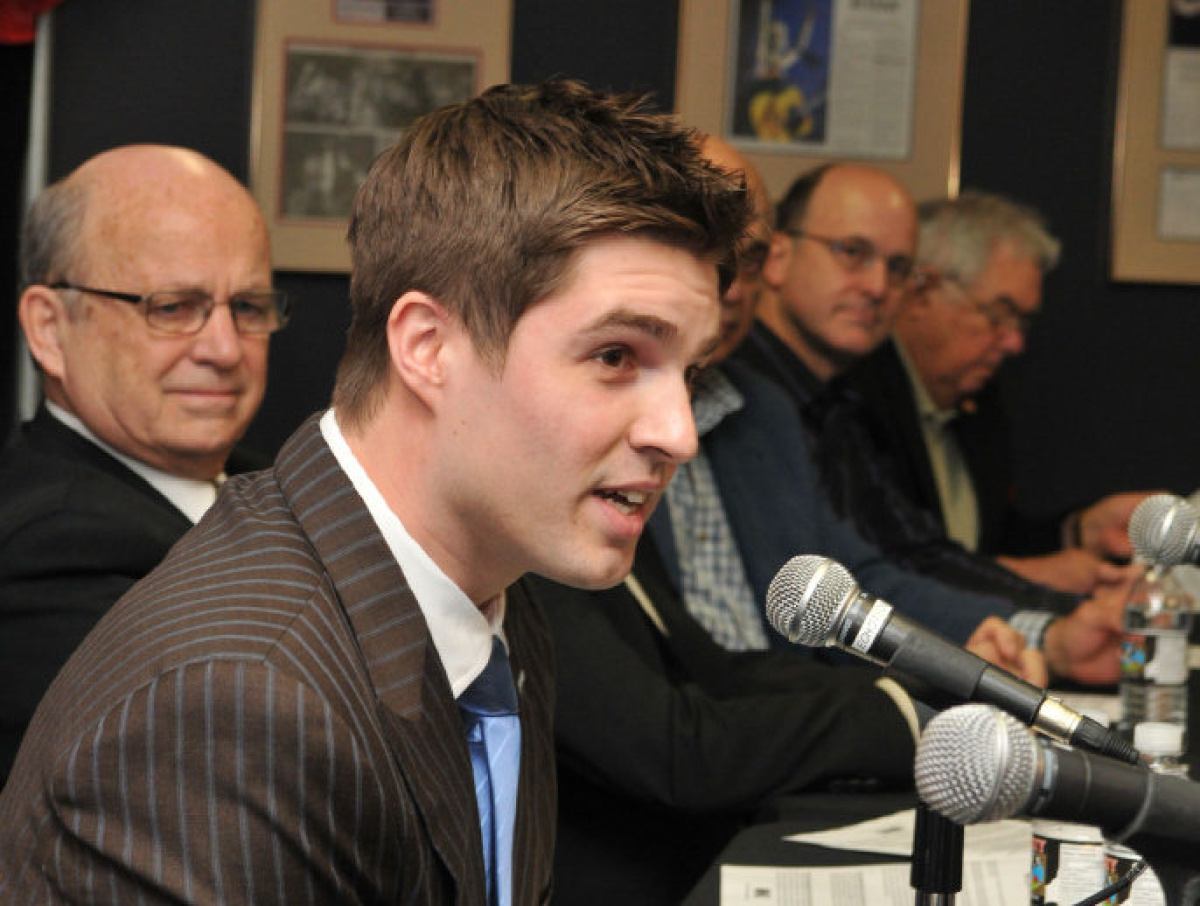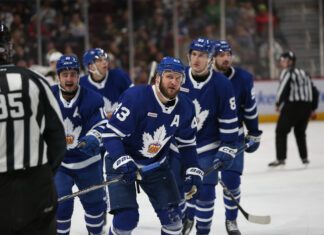New General Manager Kyle Dubas joined TSN Overdrive on Friday afternoon, discussing his learning curve in the NHL, what he learned under Lou Lamoriello, the challenges ahead this offseason, and more.
Take us through the past few years. When you first came in, we would have you on and talk to you a lot, and then Lou came in and we couldn’t talk to you anymore. What has been going on with you?
Dubas: Well, I had a lot of fun working with Lou. The first year I was working with Dave. Obviously, Dave Nonis and Lou, I learned a lot from both. Very different styles of management. Lou’s is well documented. I grew to enjoy being in my own cone of silence. A lot of people would look at it and say, “Gee, don’t you wish you could go and do this show or that show? Don’t you get a lot of value from doing that?” I really learned from over the years to just go and enjoy being able to do the job and not have to worry about doing all of the ancillary things that go with having to work in Toronto or anywhere in hockey. It’s really just been grinding away on the player development side, which includes the Marlies and the R&D group, and continuing to just evolve with whatever Lou has needed on the Leafs’ side. It’s been a great three years and great working for Lou, for sure.
Did he have kind of one staple where you said, “Wherever I go in this industry, I’m always going to keep that one thing with me and do the same thing?”
Dubas: He has this way of phrasing it that has been repeated over and over, which is, “If time is on your side, use it.” Every time I am making a decision now, hockey or non – whether it’s family or personal stuff – the underlying maxim there is just patience and being able to use your patience and build your patience. It’s really helped me to improve my decision-making and the way in which I make decisions, and the quality of them. I know it’s not one of the rules that people like to look at — whether it’s the grooming or the shaving, or what not — but whenever I am going to do something, I picture Lou kind of saying it to me, repeatedly.
You mentioned what you’ve been doing working with the Marlies in player development. But in terms of the Maple Leafs, day to day, if you guys are working on a trade or a signing, how involved have you been in those decisions? Have you been in the room? Take us through your involvement in terms of the Maple Leafs the past few years.
Dubas: The way it was set up and the way Lou wanted it set up – he explained it to me when he first came on – he thought the best thing for my development was to really grab the player development system, whether that was the Marlies or players outside of our direct control, and really grab a hold of that. As it pertains to the Marlies, really manage it as I would an NHL team, whether that be relations with the players, the coaches, the public relations team – just really grab that and own that. At the beginning, I was a little bit apprehensive, but as the years went on, especially going into last year and into this season, I could see the benefits of that really beginning to come to fruition. What I would do on a daily basis is start with the Marlies – if you’re at the MCC, you’re all together there anyhow – and then I would basically meet with Lou at the ACC in the afternoon and talk on the phone repeatedly throughout the day about different things that were going on and happening with our team, or different things we were considering doing.
He was very, very inclusive, especially as I earned his trust. I never looked at it as he had to come in and spill everything to me. I don’t know if that was his personality, but I felt I had to earn his trust. As time has gone on, especially into this last season and working together for two years, the relationship was just outstanding and a massive, massive help to me. I learned more than I ever could’ve thought when he first came on in July of 2015.
The one constant since you got here would be the guy who hired you, Brendan Shanahan. Brendan was asked about his role in the operation of the team day-to-day with player personnel, etc. He basically said he’s there for support when need be. Can you give us some examples of when you would lean on a guy like Shanahan going forward?
Dubas: Any time you have a player in your organization who has played and had success and then moved from the NHL to his position that he is in now, you’d be remiss to make decisions in regards to the hockey team without at least bouncing them off of him. That would apply to most people in the organization – Mark Hunter, Brandon Pridham, Mike Babcock, etc. That has always been the way that I have been, whether it’s in Sault Ste. Marie or with the Marlies or with the Leafs. You have people and people are massive assets to the organization. Brendan was clear on that. My style has always been and will continue to be to include everybody in what we are doing and have that become our decision-making system.
Your style as a manager – obviously, as you gain more experience, it evolves and grows. How are you going to translate that to the biggest stage? You just mentioned the Soo. It’s a smaller stage. The AHL is not as big of a stage but still a massive stage. Now you’re on the grandest stage, which is a great opportunity for you. How will you translate that into what this market kind of expects?
Dubas: What I would do is the same thing that I did when I went into the Soo. A lot of the people had the same questions, understandably. I had my personality and the way that I am, the way that I treat people in general, taking aside the hockey part of it. When I got in, and kind of got my footing there and found myself, I continued to evolve and adapt. The Leafs has been interesting because it was different the first year and then it was different from Dave departed and Lou came on. You have some experience in there. The one benefit to that that I think will make this transition easier for me is that a lot of the players – a good portion of the players – played for us with the Marlies. They kind of have an idea for how I am and how I manage. The stakes are obviously higher for the players and where they’re at and their ability to make a living, and for me in my responsibility to the city and the organization. I think I’ll take the same tact; I know I’ll take the same tact that I took into the Soo and then Toronto and apply that here. I’m just trying to be me and not trying to imitate anyone else or their management style, and then I’ll continue to adapt and evolve as I think I am maybe underachieving in certain areas, for sure.
When you came on the scene here, you were kind of known as a numbers guy. Being around guys like Shanny and Mike Babcock, has that kind of given you a different outlook? That the numbers have to match the determination with the eye test?
Dubas: It’s interesting because, when I first went to Sault Ste. Marie, I definitely wasn’t a numbers guy. I worked in scouting and worked for the team from a very young age. When I went there, it’s a great organization and the ownership is fantastic, but the reality is they don’t have the same resources as others in the league. We had to find a way to improve our decision making and I had always been very interested in the way that different sports were using data and objective data and information to supplement or improve their decision-making. When I went to Sault Ste. Marie, we started to incorporate that in.
Purely because of the timing of it and the way that evolution was going in different sports, it became something that got latched onto with my reputation. I don’t really spend time fighting what other people are saying because I’d waste my whole day around fighting that. I found a great deal of value in using that data and having it become a part of my decision-making process but also relying on your scouting info, what you’re getting from your coaches, your players’ character, and so on and so forth. I think those people that you mentioned – whether it’s Brendan, Mike, Lou, Mark – you learn something from them because of their experience and success in the game. You just add what you’re learning from the other aspects to help that.
Brendan admitted today that Mark Hunter wanted the job. You were both interviewed and Mark is still employed by the team. That could make some things uncomfortable. Take us through your thought process when it comes to those relationships and those guys, in particular.
Dubas: I think, once the dust settles, it would be very beneficial for us to sit, and I think everyone in the end wants to know where they stand and where they’re at moving ahead. For me, I think it would be premature for me to comment on where everyone in the organization is at, with me moving to the GM chair to today. My goal is, in the next week or two, is to begin to sit down with everybody and begin to get their take on what they think they’re capable of, where they think they fit, and for me to make a decision on whether they fit moving forward.
If you’re referencing Lou, Lou right now is a great mentor and continued advisor to me regardless of what his title is, or anything like that. I think he’ll always be around for me personally and I hope continues to stay in that role with the team, of course. It’s a great resource for me, and he just does a great deal for me personally. It’d be great.
Potentially there is a lot of heavy lifting this summer. Nylander is an RFA. As of July 1, you can hand out contracts to Matthews and Marner. They’re three cornerstones up front. We know some of the issues on the defensive end. As you look at it now, where is the focus going to be as far as building this team? You’ve got a very good team. How do you build it into being very great?
Dubas: As I said earlier today, and have continued to say, I think that is the major focus. There has been a lot of climbing done, but the hardest part of the climb is going to be in the next few years. How are we going to get ahead of where we were the last few seasons? What steps are we going to take? We are going to accrue some natural improvements in the development of the players because they’re still very young. It’s on us to continue to improve and develop and get better. As it pertains to supplementing the roster, we have the ability with our situation – as it pertains to the salary cap and so on and so forth – to explore whatever is out there and to add anything that we think is good value, that can help the team, without sacrificing the long term. It is exciting.
As it pertains to the player contracts, they’re obviously important. They’re going to take up a lot of everyone’s discussion and time – and justifiably so because of the way those players have started their careers. On Monday morning, I’ll begin sitting with Brandon Pridham and we’ll start going through the various scenarios, and then we’ll have a sound strategy to tackle those once we’re eligible to do so.
Outside of the business and that, any vanity purchases? Anything exciting? You’re GM of the Toronto Maple Leafs. Anything from a personal standpoint? Your life has changed.
Dubas: I leave that to the boss at home to decide, by and large. Obviously — we talked about it, my wife and I, last night — today is going to be a major change in the way that we live and operate. But the community here has been so great. Sault Ste. Marie is very small. A very rabid fan base. They were negative when we came in and started, and once we got good, they became worse because they were telling why you weren’t good enough. Every single place you went. Here, in this community, it’s so big that a lot of the time people have no idea who you are. That may change. But the community is so welcoming and it’s a great place to live and operate — even the media and everybody involved. It makes it a lot of fun. It’s an exciting challenge and we’re looking forward to it.































![Craig Berube Post Game, Leafs 6 vs. Sabres 3: “Our team played really hard in front of [Murray]… They were dialed in for him” Craig Berube, Toronto Maple Leafs head coach](https://mapleleafshotstove.com/wp-content/uploads/2024/12/berube-leafs-tor-pg-100x70.jpg)

